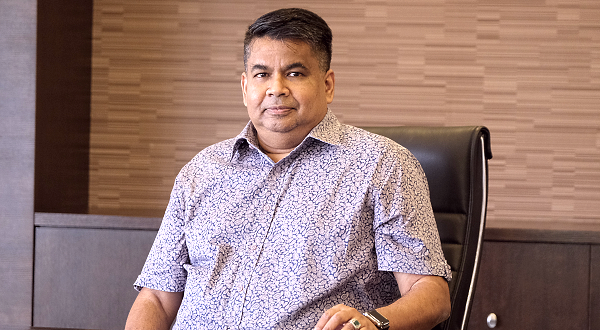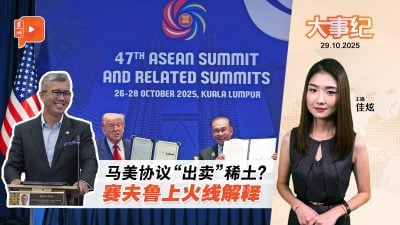
Great powers come in various definitions and shapes, the key of which is their interest to exercise not only their hard and soft powers in international relations but their institutional powers at various global institutions, foremost of which is the United Nations (UN).
Although it is Malaysia’s bilateral relationships that are often given utmost importance, followed by Malaysia’s relationship with various multilateral bodies such as the Association of Southeast Asian Nations (Asean), the East Asian Summit (EAS) and the Asian Pacific Economic Cooperation (APEC), even Malaysia and Indonesia’s joint relationship with the handling of the European Union (EU), the latter on the issue of palm oil, it is worth noting that everything comes down to one thing: the ability of Malaysia to balance the seemingly diverging interest of the great powers in the multipolar world.
In this context, those responsible for the foreign policy of Malaysia has to understand that the very word “balance” is extremely fluid.
First and foremost, does “balance” imply the perpetual need to allow the United States to be the security guarantor in the Indo-Pacific region?
If the answer is in the affirmative, then how does one constrain the US from over exerting this role, lest Malaysia and other member states of Asean are caught in the Sino-US quagmire?
Second, if the US is not ideal in performing any role to be a just and fair security protector of regional stability, then how does Malaysia help the US understand that it must learn how to respect the centrality of Asean?
For instance, Prime Minister Anwar Ibrahim spoke firmly of the need to handle Myanmar with a clear stance in his two-day visit to Bangkok.
This involves the suspension of Myanmar from the membership of Asean. Yet, according to reports coming out from the Center of Strategic and International Studies in Washington DC, the US still has some military exercises in mind with a junta that the Biden Administration is against since February 1, 2021.
All these confusing signals make for an ambiguity that makes Malaysia unable to follow through with pressing on with the case of suspending Myanmar’s membership in Asean.
Third, can the balance of power be obtained by Malaysia urging the US and China to work put their differences first? And, potentially, their differences over the concept of One China, respecting the sovereignty of China over Taiwan, and ideally, not get drawn in to make the US-China trade war that began in 2018 any worse than it is?
In this context, the emphasis is more on Beijing and Washington DC finding a solution to their own bilateral relationship.
It is not the least healthy, for instance, to have no senior members of the Biden administration making a visit to Beijing since November 3, 2020.
Fourth, can the balance of power be obtained by Malaysia and Indonesia both urging China, Japan and South Korea to work well with Asean first in the form of Asean Plus 3? This is a mechanism that has been around since 1997.
Whether it is the collectivity of the member states of Asean meeting the leaders of China, Japan and South Korea separately, the key is that they attempt to meet indeed. Rather than not at all.
Finally, would it be wise to see India and China reaching some kind of balance first?
Since these are the two most populous countries in the world that are nestled against each other both in the entire land and maritime geography of Southeast Asia.
Yet, this is a question that Malaysia, together with Indonesia and other member states of Asean, has to pursue with quiet vigor – without trying to pitch one against the other – as both have domestic politics that are difficult if not impossible to comprehend.
In leading Malaysia to a new era, Prime Minister Anwar Ibrahim has to find the correct concept of balance of power that is concurrently agreeable to all member states of Asean, with or without Myanmar as an active member state since the junta has failed to keep Myanmar all in shape, leading to an orgy of violence that is now wrecking the whole multiethnic country.
Why should one care about Myanmar given that it is an entity that is fast becoming a failed state if not already one?
Over the years, especially since the admission of Myanmar as a full member state of Asean in 1997, the track record of the regional organization has shown itself quite adept at preventing interstate violence.
The latter has been expanded to carry the moniker of the East Asian peace, where battle related mortalities between two or more states across the region of East Asia have dropped by almost 99 percent.
Yet, as the geopolitical tensions of East Asia continue to inch upwards, with the US and China unable to solve their quagmire, even on issues as minor as the weather balloons – which the US insists it is a form of surveillance activity conducted in the airspace of the US and Canada by China – Beijing has returned the volleys. Beijing has accused the US of the same.
To the degree Asean cannot resolve or stabilize the issue in Myanmar, then the so-called centrality of Asean would be seriously doubtful to begin with.
If Asean cannot manage the problems that are emerging from one’s neighbor, then one is unable to remove any tinge of doubts that Asean is but a region branding exercise.
(Rais Hussin is the President and Chief Executive Officer of EMIR Research, a think tank focused on strategic policy recommendations based on rigorous research.)
ADVERTISEMENT
ADVERTISEMENT








































